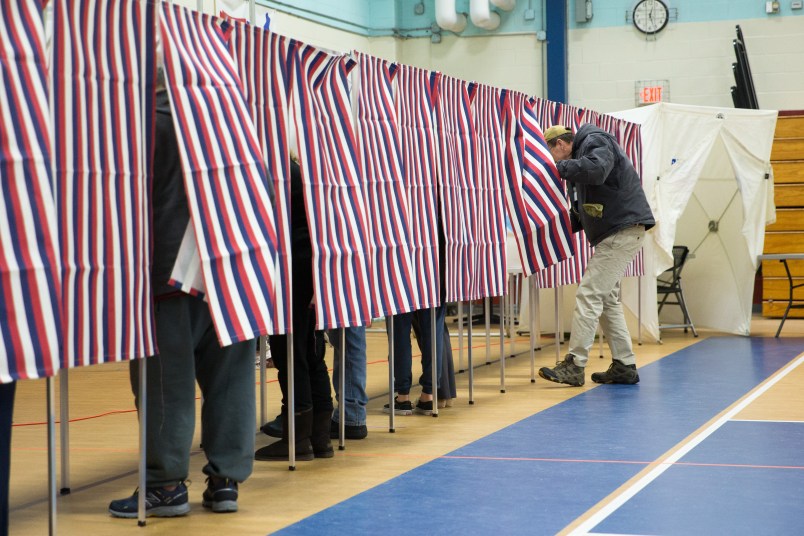This article is part of TPM Cafe, TPM’s home for opinion and news analysis.
The movement for major campaign finance reform is closer to overhauling our system than at any point in the previous four decades.
Last year, the House of Representatives passed HR 1, the For The People Act, an omnibus pro-democracy bill that included public financing of congressional elections — the most effective way to democratize political influence. Though the bill languishes in the Senate thanks to Majority Leader Mitch McConnell (R-KY), every major Democratic presidential candidate has now pledged to pass public financing if elected.
In other words, with a change in control of government, meaningful money in politics reform is finally within reach. But underneath this progress is a growing split among reformers over the details of a federal public financing system. And the stakes of this debate could have radical implications for the future of democracy.
Sen. Elizabeth Warren (D-MA), who has centered her 2020 presidential bid on an anti-corruption platform, has endorsed a small donor matching system in which all donations under $200 are matched at a rate of 6-to-1. That means that a $10 donation becomes $70 dollars.
Such a plan is largely based on that of New York City, which has boasted a successful public financing system for decades. It was also the model included in the For The People Act.
Matching systems amplify the power of small donors, allowing their money to better compete against that of big contributors. Joining Warren in support of this idea are ex-Vice President Joe Biden, and Michael Bloomberg, though neither has released the details of their plans. (Note: Bloomberg’s campaign finance plan has, strangely, disappeared from his website.)
Others, most prominently Sen. Bernie Sanders (I-VT), have endorsed a much bolder idea: Giving every American vouchers to donate to eligible politicians. Seattle adopted this model — called “democracy vouchers” — in 2015. City residents receive four $25 vouchers to contribute to participating local candidates. Preliminary results suggest this program has been a great success. Indeed, democracy vouchers even appeared to provide candidates with enough grassroots fundraising to fend off a deluge of spending by Amazon and other corporations in the 2019 municipal elections.
Of current candidates, former Republican Gov. Bill Weld and Rep. Tulsi Gabbard (D-HI) have expressed support for democracy vouchers. Before dropping out of the race, Andrew Yang, Sen. Kirsten Gillibrand (D-NY), Tom Steyer, and former Governor Deval Patrick also endorsed the idea. To its credit, the For The People Act includes a pilot voucher program which would apply to three to-be-determined states, but the provision only allocates one $25 voucher per voter and requires individuals to actively request the voucher — greatly reducing its potential impact.
Either of these two public financing systems would be a major improvement over the status quo in which a gatekeeper class of unrepresentative donors finances campaigns. Nevertheless, there are meaningful differences between them, with ramifications that affect which voices are empowered.
Matching systems have been used more frequently, and as such, there is more data to prove they work. And in aggregate, small donors can have more influence ($200 matched 6-to-1, for instance, becomes $1400 — far more than the $100 worth of democracy vouchers that voters would have received under Yang’s plan).
But matching systems require donors to have discretionary funds. In an age defined by extreme economic inequality, in which few can afford significant unexpected expenses, there is a real risk that participation would be limited. And critically, the threshold that is set for matchable contributions must be carefully chosen.
The higher these thresholds, the less representative fundraising will be. Warren’s plan is significantly better in this respect than, for example, that proposed by former presidential candidate Beto O’Rourke, which matched up to $500. Yet, even a $200 threshold likely acts as a subsidy disproportionately beneficial to upper- and upper-middle class donors, for they will be the ones able to max out matchable donations.
Even so, there is no question that a matching program would democratize influence for those who can give and expand the donor pool to a significant degree.
Democracy vouchers, on the other hand, are novel, and as such, there is limited data on their effect. It is therefore understandable why some candidates may be hesitant to roll out this largely untested system on the federal level. However, the program’s benefits should outweigh any fears.
Under democracy vouchers, everyone, regardless of wealth, becomes a political donor, radically expanding the donor class. Indeed, evidence from Seattle shows that some candidates began to solicit support from communities that have never previously been targeted — such as those living in low income housing or experiencing homelessness.
And though the aggregate amount one donor can contribute through public financing is less under a voucher system than a matching one, such a fact is likely to the program’s benefit; there are no fears that the program subsidizes unrepresentative donors.Instead, candidates and volunteers must engage in unprecedented canvassing to collect vouchers, fundamentally blurring the traditional distinction between fundraising and grassroots outreach.
Democracy vouchers plainly have more potential than matching systems to democratize influence. As Congress debates the future of our democracy, presidential candidates endorsing matching systems should be willing to at least boldy experiment with democracy vouchers as part of a broader public financing package.
That public financing is now on the forefront of political discourse is reason to celebrate. But the fight is far from over: So much more work is required to get campaign finance reform passed and far more consideration must be given to the structure of any proposed public financing plan.
Adam Eichen is the Campaigns Managers for Equal Citizens in Cambridge, Massachusetts.






